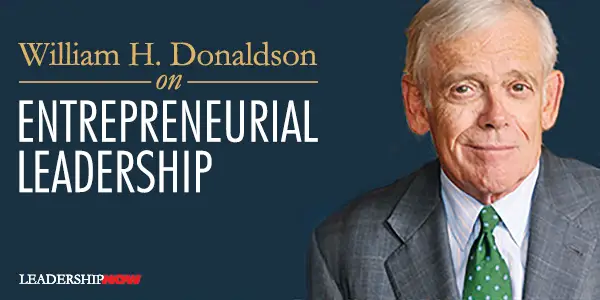 |
 |
11.19.18

William Donaldson on Entrepreneurial Leadership
W Donaldson and Karl Weber extract relevant lessons for leaders in Entrepreneurial Leader. The thread that runs through his career is the entrepreneurial mindset. That mindset is “about the application of creative thinking and prudent risk-taking to build innovative, long-lasting organizations in any sector of the economy.” There are leaders and there are entrepreneurs, but not all leaders are entrepreneurs, and not all entrepreneurs are leaders. Simply put, I believe that entrepreneurial is a mindset—a way of thinking—and leadership is a way of acting. Entrepreneurial leadership, then, describes the way such a leader behaves. The case method he experienced at the Harvard Business School, showed him that “in many cases, the deeper you delve into a problem, the less obvious the answers are.” This realization is empowering because “since nobody really knows the one perfect solution to the kinds of real-life challenges organizations face, it’s important to have the courage to ask questions, to propose answers, to challenge assumptions, and to experiment—all of which are key elements of the entrepreneurial drive.” As founding dean and professor at the Yale school of management, he taught a course on entrepreneurial leadership. He focused on the personal characteristics of the leader. “Of course, an entrepreneurial leader needs to know about subjects like financial management, competitive strategy, market analysis, and the like. But I think those topics are distinctly secondary. More important are the human qualities that the entrepreneurial leader brings to the job—the ability to see the world through fresh eyes; the ability to pay attention to both the big picture and the small details that define a particular situation; a high degree of personal energy, optimism, and a sense of fun; the readiness to shape and define the system in which he or she operates rather than being controlled by a system someone else has created; and, most important, a strong sense of integrity.” By integrity, he means that they transcend themselves. They look beyond their ego. They remain true to the vision and commit to the value of individuals. He notes that an entrepreneur is not a gambler. “The smart entrepreneur uses careful planning, intelligent strategy, and lots of hard work to minimize the risk as much as possible.” Effective leaders must be entrepreneurial—which means getting things done, regardless of the obstacles. I found this comment especially useful as it speaks to the mission here at LeadershipNow: In the business arena, entrepreneurial leaders must think and behave as if they own the company—whether they do or not. Entrepreneurial leaders must define systems rather than be defined by them; they must adopt an ownership mentality. They understand that they must take ownership of their choices, including the smaller, day-to-day decisions they make. They must take full responsibility for them rather than attributing them to “the system” or “circumstances.” Entrepreneurial leaders also think continually about the big picture—the broader goal that everyone in the organization is supposed to be working toward—and strive to be guided not by short-term gain or personal profit but by long-term objectives that help everyone. Furthermore, entrepreneurial leaders find ways to encourage everyone in the organization to think and behave in this way, and create circumstances that help them do this. The behind-the-scenes look at the roles he has taken on throughout his life—especially the rationale behind and the building of Donaldson, Lufkin & Jenrette—is instructive. The range of his life and career demonstrate the broad relevance of the principles he describes in this book and makes for a fascinating read. 
Posted by Michael McKinney at 12:43 PM
|
BUILD YOUR KNOWLEDGE
 

How to Do Your Start-Up Right STRAIGHT TALK FOR START-UPS 
Grow Your Leadership Skills NEW AND UPCOMING LEADERSHIP BOOKS 
Leadership Minute BITE-SIZE CONCEPTS YOU CAN CHEW ON 
Classic Leadership Books BOOKS TO READ BEFORE YOU LEAD |